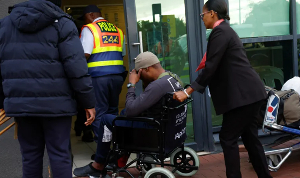The 10th Maritime Law Seminar for Judges of the Superior Courts has opened in Accra with a call on the Ports authorities and security agencies to tackle the growing menace of stowaways.
The Chief Justice, Mrs Justice Georgina T. Wood who made call noted that Ghana was reported to have the highest number of reported cases of stowaways in West Africa with about 161 cases reported in the past two years.
According to the Chief Justice, the practice was not an enviable record hence urged all stakeholders to collaborate to deal with the menace.
Mrs Justice Wood said the judiciary on their part would ensure that judges become conversant with requisite conventions spelled out by the international community in order to deal with the canker.
The Chief Justice appealed to parliament to work assiduously towards the incorporation of conventions that Ghana was a party to into national law so that judges would use them in the adjudication of matters.
“That way our judges will not be unduly chastised unduly by the public,” he noted.
The two-day seminar which attracted over 75 judges would delve into liability issues in respect of maritime safety: public and private law perspectives, unravelling the complexities of maritime boundary delimitation and priority of maritime claims.
The yearly seminar seeks to strengthen, the nexus between maritime commercial interests and the judiciary and to serve as a forum that would bring peculiarities of the practice of maritime laws in the country.
On the current exploration of oil and gas in the country, Mrs Justice Wood noted that it had come with increased volumes of trade at the ports, with attendant maritime commercial dispute, the threat of piracy, menace of stowaways and pollution of the country’s marine environment.
According to her, there was therefore the need to establish Admiralty Courts staffed with judges imbued with requisite and expertise to handle admiralty matters and expand the legal frontiers.
Mrs Justice Wood said that she intended to establish Admiralty Courts in Accra, Tema and Takoradi, adding that one had been established in Tema which was opened at the beginning of the 2014 and 2015 legal year.
She appealed to the Ghana Shippers Authority (GHA) assist the judiciary to establish a robust appellate bench.
The Chief Justice attributed the achievements chalked by judges in the maritime trade and transport cases to the continuous education given to them during seminars.
In a speech read of her behalf, Mrs Marietta Brew Appiah Oppong, the Minister for Justice and Attorney General, said the country was confronted with a grave national security and economic concerns that demanded constant attention and commitment.
Referring to the maritime boundary dispute between La Cote d’Ivoire, she said Ghana had served Cote d’Ivoire with notices and expressed the hope that the current seminar would provide an in-depth appreciation of the issue.
Mrs Joyce Bawa-Mogtari, Deputy Minister of Transport, said the government has appointed a Transaction advisor to package the Bonkra Inland Port project and the Easter Railway line in order to seek strategic investors to execute the project on a private/ public partnership basis.
She said projects would complement efforts in decongesting Ghana’s seaports and create an enabling environment for the development of ancillary industries.
It was also open up more employment opportunities for the youth and also enhance the lifespan of the country’s roads, she added.
Dr Kofi Mbiah, the Chief Executive Officer of the Ghana Shippers Authority (GHA), said by the next 15 years, Africa’s population was expected to reach one billion adding that would demanded for more goods and services.
He said by the next decade, global sea born trade would double from 11 billion tons to 22 billion tons.
According to Mr Mbiah, the quest for cleaner energy to power the shipping industry as well as increase manufacturing output would be a challenge.
He therefore urged stakeholders in the shipping industry to grid their loins in order to stand up to the challenges.
“The quest for unhindered and unfettered access through the sea and harmonization of operational requirement would require global regional and national regulation,” he said.
Sir Justice Dennis Adjei, the Director of the Judicial Training Institute, said as judges they needed to acquire knowledge in maritime law so they could effectively handle all maritime cases due to their sensitive nature.
According to him,” a judge ignorance or little knowledge in maritime law may cause the nation an irreparable injury".
Regional News of Friday, 17 October 2014
Source: GNA
Chief Justice calls for halt to stowing away
Entertainment












